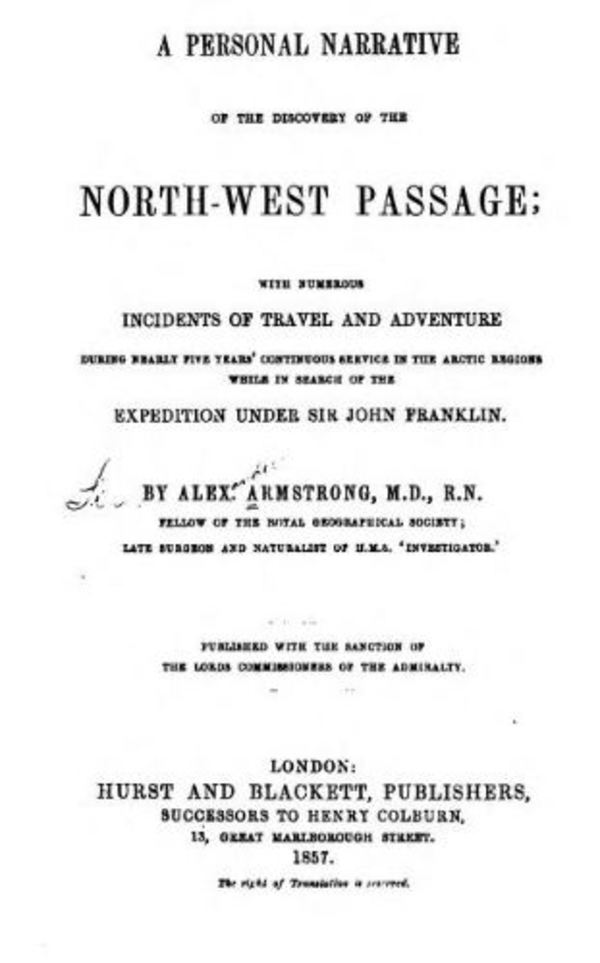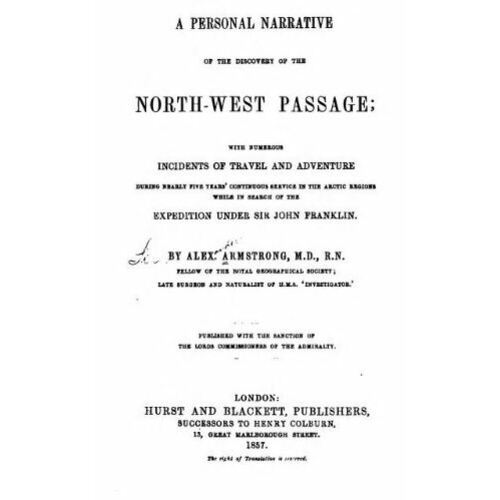
Source: Link
ARMSTRONG, Sir ALEXANDER, surgeon, naval officer, explorer, naturalist, and author; b. 1818 in County Donegal (Republic of Ireland), son of Alexander Armstrong of County Fermanagh (Northern Ireland); m. 1894 Charlotte Hall, née Simpson; d. 4 July 1899 at the Elms, Sutton Bonington, England.
Alexander Armstrong, who had studied medicine in Dublin and at the University of Edinburgh, joined the Royal Navy as assistant surgeon in 1842. Gifted in his profession, he was commended by his superiors for effecting improvement in naval hygiene, and on 19 Oct. 1849 was promoted surgeon. That December he was appointed surgeon and naturalist to the Investigator under the command of Robert John Le Mesurier McClure*. The ship was one of two vessels commissioned to sail to the western Arctic by way of Bering Strait in search of the ships of Sir John Franklin*, missing since 1845. The commanding officer was Captain Richard Collinson* in Enterprise.
The two vessels left England in January 1850; on the voyage out McClure, over-eager for distinction, separated from Collinson and that July entered the Arctic waters alone. He coasted eastwards, discovered Prince of Wales Strait, and, traversing it, came in sight of Viscount Melville Sound, which had already been visited from the east by William Edward Parry* in 1819. McClure thus completed the tracing of the northwest passage between the Pacific and Atlantic oceans through the Canadian archipelago. Investigator was eventually forced back down the strait by gale-driven pack-ice, thrown over on her side, and almost wrecked. In the summer of 1851 McClure rashly attempted to round Banks Land (Banks Island, N.W.T.) along a coast which Armstrong described as “without parallel for the dangers of its navigation in any part of the world.” Almost crushed against rocky cliffs, the ship escaped through a channel so narrow that her yard ends scraped against the towering ice walls that hemmed her in. McClure finally reached Mercy Bay on the northern shore of Banks Land, where the Investigator spent the winters of 1851–52 and 1852–53 beset in ice. Her men, on half rations for many months, were on the verge of starvation by the time they were rescued in April 1853 by Lieutenant Bedford Clapperton Trevelyan Pim*. Pim had come by sledge from Resolute, commanded by Captain Henry Kellett*, which was then in Viscount Melville Sound. McClure was resolved to get his ship out but Kellett ordered that it be abandoned. Armstrong’s plant and animal collection perished with the ship, but he managed to keep his journal despite McClure’s orders to his officers that their records were to be left on board. After further mishap and another winter in the Arctic, the men returned to London by way of Barrow Strait in September 1854 aboard supply ships of another expedition in the Franklin search, commanded by Sir Edward Belcher*. The party had in effect traversed the northwest passage by sailing on three different vessels in succession and making two intermediate sledge treks covering hundreds of miles over the frozen seas.
Throughout the trip the clever young doctor was too conscious of his superior endowments to be popular with his brother officers. During the first winter spent in the Arctic, his wardroom mates made him the victim of horseplay so rough that Johann August Miertsching*, the Moravian missionary who accompanied the party as interpreter to the Inuit, expressed surprise that the captain took no notice. This neglect may account for Armstrong’s intense dislike for McClure. For his part, McClure seems to have undervalued the surgeon’s medical work, which the men rated most highly. Armstrong appears to have been as intimate with the men of the lower deck as his rank permitted and so diligent in caring for them that only 6 of the 66 men, who faced starvation and scurvy much of the time, died during the entire voyage. On arrival in England the petty officers and men of the ship thanked Pim and Armstrong for their services.
Although Armstrong’s maintenance of health and morale on the long and tortured cruise was a creditable demonstration of competence and zeal, his monument is the history he wrote of the tarnished but glorious exploits of the 1850–54 expedition. His Personal narrative of the discovery of the north-west passage, published in London in 1857, was the last of the three chronicles of the voyage to appear. McClure’s own journal, edited by Captain Sherard Osborn* and published in 1856, is a brilliant whitewash which suppresses the uglier features of the cruise. The previous year had seen the publication of Miertsching’s journal which, although emotional and inexact, is confirmed in substance by Armstrong’s sober chronicle. The latter is a lucid and straightforward, although somewhat ponderous, account of the phenomena, animate and inanimate, which came under the author’s observation. It furnishes moving descriptions of appalling peril in the wind-driven pack-ice, along with a candid exposure of the condition to which the crew were reduced, thereby contradicting McClure’s arrogant boast that he could have saved the men’s lives without external aid. The book was awarded the Gilbert Blane gold medal for the best journal kept by a surgeon of the Royal Navy.
Among the published journals of Arctic exploration, Armstrong’s Personal narrative holds first place with Franklin’s Narrative of a journey to the shores of the polar sea in interest and value. The prosaic, methodical Irish surgeon has given us a Canadian Odyssey almost as grotesque as the original and possessing the dignity and authority of history. Restrained though his language may be, he is unmatched in depicting travel through turbulent seas, in cold and hunger, on a barren, desolate shore.
In 1858 Armstrong’s Observations on naval hygiene and scurvy, more particularly as the latter appeared during a polar voyage was published in London. He spent the following decades on seagoing appointments in the Baltic Sea and the West Indies, as superintendent of the naval hospital at Malta, and as director-general of the Royal Navy’s medical department. He was awarded a kcb in 1871 and in 1880 retired to a quiet life. In 1894, five years before his death, he married the widow of Sir William King Hall.
R. [J.] Le M. McClure, The discovery of the north-west passage by H.M.S. “Investigator,” Capt. R. M’Clure, 1850, 1851, 1852, 1853, 1854, ed. Sherard Osborn (London, 1856). G. F. M’Dougall, The eventful voyage of H.M. discovery ship “Resolute” to the Arctic regions in search of Sir John Franklin and the missing crews of H.M. discovery ships “Erebus” and “Terror,” 1852, 1853, 1854 . . . (London, 1857). J. A. Miertsching, Reise-Tagebuch des Missionars Johann August Miertsching, welcher als Dolmetscher die Nordpol-Expedition zur Aufsuchung Sir John Franklins auf dem Schiffe Investigator begleitete ([Gnadau, (German Democratic Republic)], 1855; 2nd ed., Gnadau and Leipzig, [German Democratic Republic], 1856); translated and edited by L. H. Neatby as Frozen ships: the Arctic diary of Johann Miertsching, 1850–1854 (Toronto, 1967). Times (London), 7 July 1899. A concise dictionary of Irish biography, ed. J. S. Crone (London, 1928), 4. DNB.
Cite This Article
L. H. Neatby, “ARMSTRONG, Sir ALEXANDER,” in Dictionary of Canadian Biography, vol. 12, University of Toronto/Université Laval, 2003–, accessed December 30, 2025, https://www.biographi.ca/en/bio/armstrong_alexander_12E.html.
The citation above shows the format for footnotes and endnotes according to the Chicago manual of style (16th edition). Information to be used in other citation formats:
| Permalink: | https://www.biographi.ca/en/bio/armstrong_alexander_12E.html |
| Author of Article: | L. H. Neatby |
| Title of Article: | ARMSTRONG, Sir ALEXANDER |
| Publication Name: | Dictionary of Canadian Biography, vol. 12 |
| Publisher: | University of Toronto/Université Laval |
| Year of publication: | 1990 |
| Year of revision: | 1990 |
| Access Date: | December 30, 2025 |



